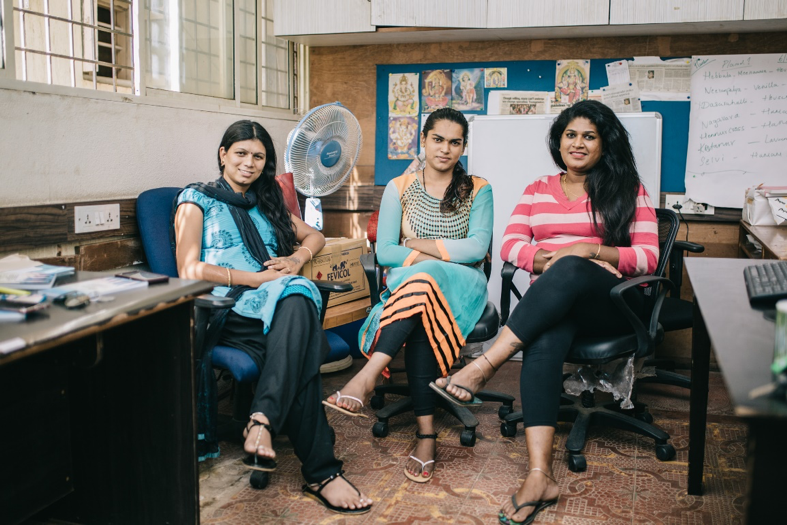This article was published more than 6 years ago.

A week after India’s Supreme Court struck down a colonial-era legal provision used to criminalize same-sex sexual relations and undermine the rights to privacy and choice, activists across the country are still celebrating—and here at the Fund for Global Human Rights, we are rejoicing with them.
The landmark decision is the result of over two decades of tireless campaigning by LGBT and women’s rights groups in India, including many organizations supported by the Fund.
Having met a number of these tenacious activists over the years, I am not at all surprised by their success. Indian activists have always been on the cutting edge of various human rights issues—especially when it comes to advancing rights related to sexual orientation and gender identity and expression. Their creativity and passion have long inspired me, and I’m thrilled to see it pay off in a way that will have repercussions not only in India, but around the world.
“This judgment has given us a big heart and a big boost. The Supreme Court is ringing back and defending our constitutional rights,” said Akkai Padmashali of Fund grantee Ondede-Swatantra, which promotes the rights of LGBT people, women, and children in Karnataka state.
Maya Sharma of Vikalp Women’s Group—another women’s and LGBT rights organization the Fund supports—echoed Akkai’s sentiments. “First, we were speechless, then hugging and congratulating each other,” she recalled.
Both Ondede-Swatantra and Vikalp conducted intensive outreach to educate and mobilize communities around the case, and to engage existing and potential allies on the issue. Other Fund grantees who played a direct role in advocating for the verdict include Karnataka Sexual Minorities Forum and Praytay Gender Trust. The Fund provided previous support to the groups Aneka and Sangama, who also played a key part in the victory.
Challenging Section 377
The 500-page Supreme Court judgment declares unconstitutional Section 377 of India’s penal code, which forbids “carnal intercourse against the order of nature.” Introduced by British colonizers over 150 years ago, the law has long been used as a basis for harassment, discrimination, and violence against LGBT people by citizens and government officials—including police—alike. Activists across many British Commonwealth countries that still have colonial-era sodomy laws on the books hope to capitalize on India’s lead in finally overturning the statute.

LGBT and other human rights activists and supporters in India have been decrying Section 377 for years and logged multiple petitions with the Supreme Court. But it was a petition by Akkai and her Ondede-Swatantra colleague, Sana Shree, that finally brought the case to the court’s docket.
The legal strategy behind Akkai and Sana’s move was unique: as transgender women, they framed Section 377 as a violation of their fundamental constitutional rights, including the right to privacy.
“Myself and Sana were both in the Supreme Court when the petition went forward. When my [lawyer] stood up to argue on behalf of our petition, there was a pin-drop silence in the court,” recalled Akkai.
The judges’ initial response was to refer to the groundbreaking judgment of 2014, in which the Supreme Court recognized the fundamental and civil rights of transgender persons. The judges asked Akkai and Sana why they needed to address Section 377, given this earlier verdict. The activists explained that while the 2014 ruling protects certain trans rights, it still left trans people vulnerable to harassment or abuse based on who they choose to have sex with, and how.
“The judges looked at us and said, ‘This is a very important matter,’ and decided to take up the case,” said Akkai. “Their curiosity [about the issue] was just totally awesome.”
A Huge Win for Queer Indians, and for Broader Sexual Expression
On September 6th, the Supreme Court issued a ruling that goes far beyond decriminalizing same-sex sexual relations. In their verdict, the court called Section 377 “irrational, arbitrary and incomprehensible,” and declared it an affront to constitutional rights, including fundamental human rights to privacy and choice. The decision is a shared victory for countless activists, family members of people who are LGBT, medical and health practitioners, and constitutional and human rights lawyers who fought long and hard to make it possible.

“The judgment clearly says that fundamental rights are not about a majority of people asking for them, that numbers of people do not determine your fundamental rights,” said Maya. This is noteworthy, she and Akkai said, because both Indian society and the justice system have often framed what is ‘right’ and ‘wrong’ on the basis of religious, class, caste, or other ‘moralities,’ as opposed to on the basis of the Constitution—or ‘constitutional morality.’
In other words, the verdict makes the point that fundamental rights are not tied to how many people support a given right, or how they feel about a given issue. Rather, they exist and must be upheld regardless of popular trends or feelings.
“Someone who’s on the margins is often looked at more as a sexual being, as a way of putting them in this category of having a ‘bad [moral] character,’” explained Maya. “But if you have constitutional morality up front, everything else becomes irrelevant.”
By focusing on ‘constitutional morality,’ Akkai and Maya said the judgment can be leveraged to fight for the right to sexual expression more broadly.
For example, said Maya, a straight woman who has chosen her own partner may be disowned by her parents and denied her property or inheritance rights, simply because she is choosing to express her sexuality outside the constructs of an arranged marriage. The September 6th ruling gives activists grounds to fight this kind of discrimination—though Maya and Akkai agree that much more work remains to be done.
“Now we will have to conceptualize laws to protect us further,” said Maya.
While the situation on the ground may not change overnight, this remains a moment to celebrate.
“This judgment is not about gay sex, this judgment is about human sexuality, this judgment is about human rights, this judgment is about constitutionality of the largest democracy in the world,” said Akkai Padmashali. “I’m so glad the Supreme Court delivered this herstorical verdict.”


